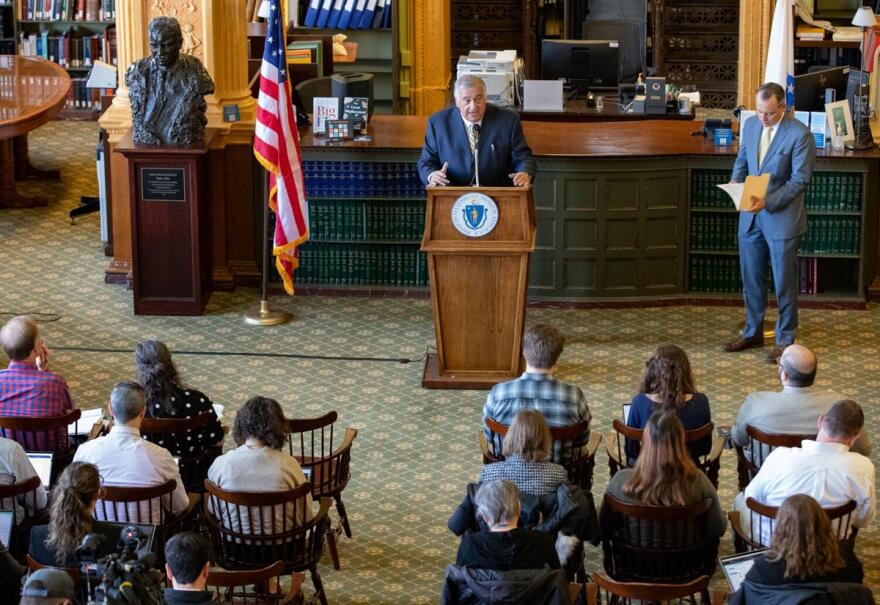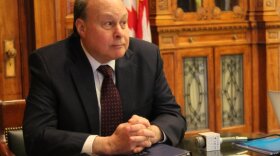Following a quiet week on Beacon Hill, Massachusetts House members are preparing to debate how the state will spend its tax money in the next fiscal year.
Back on April 10, the chamber's Ways and Means Committee released a budget proposal. Since then, House lawmakers have scrutinized that spending plan. And this week, they will hold their debate on how much to spend on everything from workforce development to clean energy.
Chris Lisinski, a reporter at the State House News Service, tells us what we should know as this debate kicks off this week.
Chris Lisinski, SHNS: As always, this debate is going to stretch over several days. It's not the kind of thing that happens all in one go. And, as always, most of the action is going to take place behind closed doors. We might get some interesting commentary on a couple of amendments, but you'll see very long periods of inactivity while top House Democrats work to partition the 1,495 amendments filed into some mega-consolidated amendments that deal with hundreds of them in a single vote.
This is the single biggest bill that Beacon Hill does every year. It funds state government operations for the entire year, with some additional spending bills taken up along the way. So, pretty much any issue you can think of — this bill will touch it in some way, shape or form.
Carrie Healy, NEPM: And help me here, process wise, when the House finishes with changes to the spending plan, they'll vote on it and then forward it to the Senate for consideration?
That is exactly correct. It's tradition for the House to do its annual budget bill in April, and for the Senate to follow suit in May. Once the Senate does its own rewrite, then it's down to a negotiating panel. The compromise will not arrive — probably — until the next fiscal year has actually already begun.
There were a lot of warnings issued by state officials last week, when the stats on tax collections for the first half of the month were released. Traditionally, legislative leaders keep close tabs on the state's tax collection picture to get a sense of total state revenues. It's essential in building out a budget. What were officials warning, and how will that complicate lawmakers' work on the state budget?
Yeah, every single month, there's a mid-month update provided by the state Department of Revenue. And every month, there are caveats that warn against using the first half of the month as a guidepost to project what the second half will be. Those warnings were even more pronounced in April — which we should note is the most critical month, represents the largest share of state tax collections — because this year, the tax filing deadline in Massachusetts was April 17. So, therefore, the first half of the month, tax collections through April 15 don't even fully account for that. Income tax returns could still be filed after this report’s data collection closed. So, it's not necessarily a guarantee at all that what happened from April 1 to 15 is going to project what will happen from April 16 to April 30.
We can't overlook the fact that still in limbo is a different spending bill that could replenish emergency shelter funding and bring back pandemic-era policies like expanded outdoor dining and cocktails to go. Negotiations on that are ongoing. Do lawmakers feel a sense of urgency to bring this to a vote?
They probably do. We know that shelter funding could run out as soon as the end of the month. But it's been several weeks with no consensus yet, so you have to take that into consideration as well.
Moving on, last week, Gov. Maura Healey voiced support for President Joe Biden and his policies. In her remarks, she highlighted western Massachusetts as having areas with some of the highest rates of poverty and unemployment in the state, saying that it represents a “great opportunity for growth.”
This was an official White House event, not a campaign one, but everything is political in an election year. How involved in Biden's reelection will Healey become? I mean, it's not like Massachusetts is a swing state.
Right, we're not a battleground state. But all signs indicate that the governor is stepping up her work as a surrogate for President Biden. That could be beneficial to her own efforts to secure federal funding and other help from Washington. Plus, she's seen in some corners as kind of a rising star on the national stage, as well.







